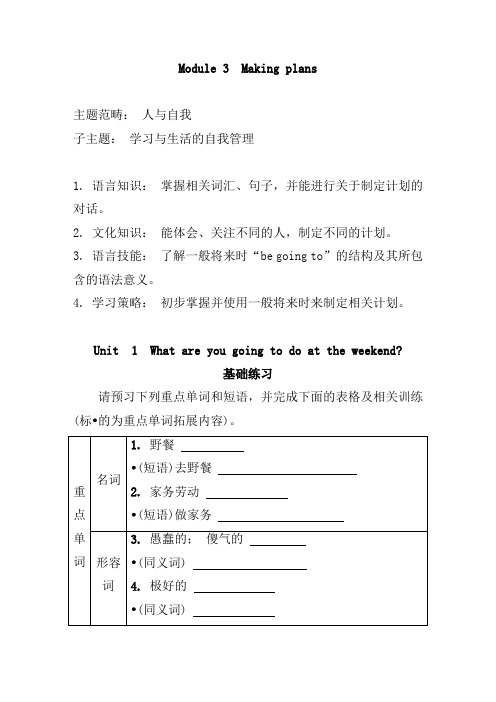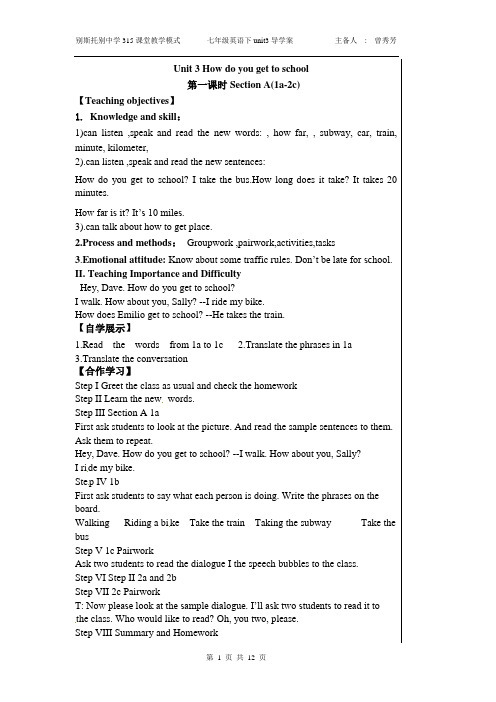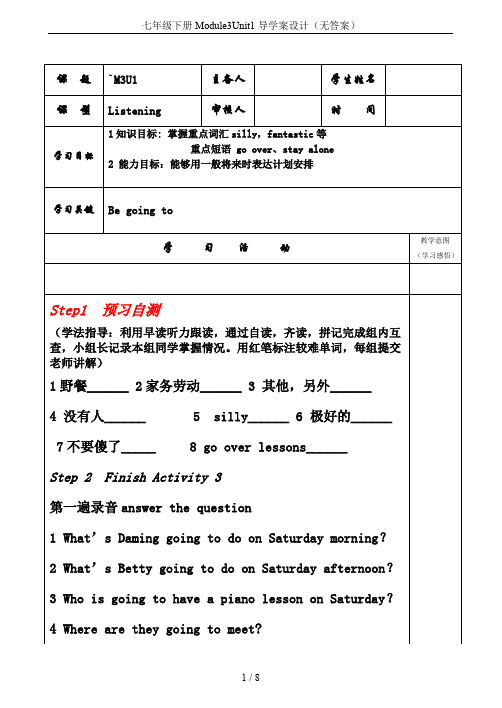陶岭中学七年级下册英语导学案模板修改版unit3导学一
初一下导学案Module3

七年级下册英语学科导学案Module3 Making plansUnit1What are you going to do at the weekend ?(第1课时)班级学生姓名一.学习目标:1.能力目标:能理解关于周末计划的对话能用所给的信息谈论周末的计划2.情感态度:养成良好的、有计划的生活和学习习惯,培养自主学习的能力二.学习重点:1.掌握一些新单词:go over,on,nobody,at,nothing,silly,fantastic,…2. 掌握句型:What are you going to do…?I’m going to … Are you going to…?Yes,we are./No,we aren’t.三.学习难点:“be going to”的意义和用法四.课前准备:1.重点单词(英汉互译)复习;练习____________ 野餐___________ 家务劳动___________在……时候________ 其他;另外__________ 没有人___________在……点钟__________ 没有东西__________ 傻气的___________极好的____________2.重点句型(请译成中文)What are you going to do at the weekend,Daming?I’m going to check my email and do my homework.-Are we going to meet here? _____________________-Yes,we are. /No,we aren’t.___________________________五.课堂教学过程:Step 1 Warming-up and review(课前热身与复习)问学生:What day is today? What’s the weather like today?What’syour favourite food? Is your food healthy? What’s the time?Did youplay computer games in winter holiday? ? Do you like winter holiday?Feedback on the preview(预习反馈).Check the answers.Step 2 Presentation(新课呈现)用课件教学,教授英语新单词。
Module3Unit1导学案英语七年级下册

Module 3Making plans主题范畴:人与自我子主题:学习与生活的自我管理1. 语言知识:掌握相关词汇、句子,并能进行关于制定计划的对话。
2. 文化知识:能体会、关注不同的人,制定不同的计划。
3. 语言技能:了解一般将来时“be going to”的结构及其所包含的语法意义。
4. 学习策略:初步掌握并使用一般将来时来制定相关计划。
Unit 1What are you going to do at the weekend?基础练习请预习下列重点单词和短语,并完成下面的表格及相关训练(标•的为重点单词拓展内容)。
学以致用根据语境或提示,完成填空。
1. What else (其他) are you going to say?2. On Sunday morning, Sam usually gets up very late.3. Let's go out and have a picnic (野餐) tomorrow.4. Don't be silly (傻气的), Mike.5. Lily often helps her mother do the h ousework at the weekend.6. Tony is going o ver his lessons at home because there will be an exam tomorrow.7. They are going to see a fantastic (极好的) film this weekend.8. He often makes fun of(取笑) others, so likes him.9. His father usually gets up at six o'clock and (check) his email.10. She is going to buy some food because there is nin the fridge(冰箱).佳句仿写用句中黑体词或短语仿写句子。
七年级英语下册导学案:M11 U3

标
检
测
英语报,第33期,Unit 2,第二大题
按要求转换举行,每空一词。
1.Steven is opening the door. (改为祈使句)
______ ______ ______, Steven.
2.Stand in line. (改为否定句)
______ ______ in line.
3.You must be careful, Susan. (改为祈使句)
It’s important to make your room clean.
___________________________________________
You cannot touch anything if the teacher doesn’t ask you to.
___________________________________________
______ ______, Susan.
4.Linda is often late for school. (改为否定祈使句)
______ _______ late for school, Linda.
5.We go to school together. (改为祈使句)
______ ______ to school.
6. ______ (事实上),wave goodbye is _______(粗鲁的)in Greece.
7. — Do you like the Japanese food? — ___________. (一点也不)
8. They are very good friends. They always walk ________(臂挽臂地) when they are together.
七年级英语下册导学案unit3-1

七年级英语下导学案学生姓名: 时间: 3月 6 日1.要求学生尽可能的说出表示交通工具的词汇2.学习并记住1a 中的新单词和短语 3.将单词与图画匹配起来 学习任务二:完成活动1b ,然后核对答案 学习任务三:完成1c.1、熟读1a 中的对话, 理解并复述.2、两人合作, 谈论1b 中人物的上学方式. ------How does Mary get to school? ------She takes the subway,学习任务四:合作交流, 小结乘坐某种交通工具的方式take the +交通工具 用来表示“乘……”相当于by +交通工具如:I usually take a bus to work. = I usually go to work _____ _____.take the train to school = go to school by train take the taxi to the airport =________________w alk to = go to…on foot ride the bike = by bike 【自主检测】:I 、精挑细选1. ------_________ . ----- By bus.A. Why does he go to work?B. How does he go to work?C. When does she go to work? 2. ----- How do you go to school? ----- I ______.A. take busB. take the busC. by the bus3. She usually gets to school on her bike. But she sometimes ______. A. walking B. walk C. walks4.I usually go to school ___ bike, but sometimes I go to school ___foot.A. with, onB. on, byC. by, on II 、句型转换1、He takes a bus to school .(同义句) He gets to school ________ _________ .2、I get to work by boat . (划线提问) ________ _________ you get to work ? Ⅲ、完美呈现1. How ________he _______to school? (get)2. Liu Pei ___________the train to school. (not take)3. He ____________ (ride) his bike to work every day. IV 完成单词1. I usually go to school by bus but s ________on foot.2. Liu Mei always rides her bike to school and she never t_______ a bus.3. I hardly ever walk to work. What a________ you?4. It t______ them one and a half hours to do their homework every day.。
七年级英语(下)Unit3导学案

第1课时Section A(1a-1c)【学习目标】:1 熟练掌握本课单词和短语.词汇: train、bus、subway、bike、car、boat、plane、walk短语:take the bus/ take the subway/ride a bike/ take the plane/ walk/ take the train/ drive the car/2 学会询问他人如何到达某地的方式。
3重点句型:How do you get to school? I take the train .How does Mary get to school? She takes the bus.(第三人称单数)一、课前自主学习---请结合学习目标参看课堂学习流程各步骤的内容先进行自主学习然后完成下列预习检测。
预习检测:写出下列单词火车____________公共汽车__________地铁___________ 自行车_________飞机___________ 到达________________ 乘地铁_____________________乘公共汽车______________________乘飞机_____________ 骑自行车______________ 走路______________ 乘火车_____________二、课堂学习流程:1. 检查预习检测2. 独学:内容为:(1)自读本课时的单词短语(结合学习目标和词汇表) ;(2)自读相关询问时间的句型3.对学:对子之间相互检查独学的内容发现不会的马上交流探讨。
4.群学--合作学习,勇敢质疑:内容为:(1)主要由各组探讨1、2环节中大家不会(读、、/懂)的内容,(2)操练本课时的重点句型(3)如何展示,在组内预展示好。
5合作探究:1)How do you get to school?怎样用英语回答。
How does he get to school?怎样用英语回答。
七下Unit_3教师_导学案

Unit 3 How do you get to school第一课时Section A(1a-2c)【Teaching objectives】1.Knowledge and skill:1)can listen ,speak and read the new words: , how far, , subway, car, train, minute, kilometer,2).can listen ,speak and read the new sentences:How do you get to school? I take the bus.How long does it take? It takes 20 minutes.How far is it? It’s 10 miles.3).can talk about how to get place.2.Process and methods:Groupwork ,pairwork,activities,tasks3.Emotional attitude: Know about some traffic rules. Don’t be late for school. II. Teaching Importance and DifficultyHey, Dave. How do you get to school?I walk. How about you, Sally? --I ride my bike.How does Emilio get to school? --He takes the train.【自学展示】1.Read the words from 1a to 1c2.Translate the phrases in 1a3.Translate the conversation【合作学习】Step I Greet the class as usual and check the homeworkStep II Learn the new words.Step III Section A 1aFirst ask students to look at the picture. And read the sample sentences to them. Ask them to repeat.Hey, Dave. How do you get to school? --I walk. How about you, Sally?I ride my bike.Step IV 1bFirst ask students to say what each person is doing. Write the phrases on the board.Walking Riding a bi ke Take the train Taking the subway Take the busStep V 1c PairworkAsk two students to read the dialogue I the speech bubbles to the class.Step VI Step II 2a and 2bStep VII 2c PairworkT: Now please look at the sample dialogue. I’ll ask two students to read it to the class. Who would like to read? Oh, you two, please.Step VIII Summary and Homework【质疑导学】1)How do you get to school?How does he get to school? Answer it总结:How + + 三单主语+ get to school?How + + 非三单主语+ get to school?2) compelte the sentences do/does -------get to ---?the bus /train /subway tomy bike to/ to【学习检测】1. I usually take the s_______ to school.2. He often goes to Shanghai by t_________.3. Twenty and twenty is f_______.4. Fifty plus fifty is one h___________.5. One hour is sixty m__________.6.你怎样去上学?_____ ______you go to school?7. 她经常步行回家. She usually ________ home.8.步行到我家花二十分钟。
七年级下册Module3Unit1导学案设计(无答案)

= Can you ______ ______ ______ my English? 请随便吃点鱼。 Please _____ _____ _____ the fish. 3.else 与 other 的区别
else 副词,意为“其他;另外”,something,anyone,nobody 等不定 代词/somewhere 等不定副词/what,who 等疑问词+else
other 形容词,意为“其他的”,other+可数名词/代词 eg: 还有人和我们一起吗? Is there anyone ________ joining us?
么毛病。
【拓展】类似于 nothing 的不定代词有:
3/8
七年级下册 Module3Unit1 导学案设计(无答案)
some- 常用于肯定句 something, somebody, someone any- 常用于否定句或疑 anything, anybody, anyone 问句
no-
nothing, nobody, none
with you.
C. Because my parents aren’t at home, and I have to look after my grandma.
D. Are you going to play games with her?
E. She is eighty years old.
5. Mary is going to clean her room on ________.
A. Saturday morning B. Saturday evening C. Sunday morning D. Sunday evening
七年级下unit3 导学案

【学习重、难点】
重点:基础词汇的音形意。
难点:长难句的背诵和理解,词汇短语句式的灵活运用,how引导的特殊疑问句
【导学流程】
一.知识链接(按照英中英的方式阅读下列短语)
◆ grow up长大,成长
◆ take sb. some time to do sth.花费某人某些时间去做某事
9.--How far is your home from school?
--It’s about two_____walk.
A. hours B.hours’C.hour’s D.hour
三.迁移运用
1. It usually takes metwo hoursto do exercise every day. (对画线部分提问)
It is difficult _____ some students _____ go to school by ropeway.
Unit 3Revision(课时三)
姓名:小组:__________
【学习目标】
1.能正确使用grow up等词汇
2.学会使用以下句型:
How do you get to school ? It takes about 10 minutes to walk and 15 minutes by bus .
2.It _____ half an hour to walk from the city library to the post office.
A.takes B.spends C.pays D.costs
3.Look! There is __________over there.
- 1、下载文档前请自行甄别文档内容的完整性,平台不提供额外的编辑、内容补充、找答案等附加服务。
- 2、"仅部分预览"的文档,不可在线预览部分如存在完整性等问题,可反馈申请退款(可完整预览的文档不适用该条件!)。
- 3、如文档侵犯您的权益,请联系客服反馈,我们会尽快为您处理(人工客服工作时间:9:00-18:30)。
陶岭中学导学案
备课日期:2012年月日学科:备课人:主审人:课题
Unit3导学1Section A 1a--1c
教学目标1.学习一些表示动物名称的词汇;
2.学会用why来询问对方喜爱某种动物的原因及其回答。
3.培养热爱自然、爱护动物的良好情操。
教学重难点1.掌握P13的新单词,会读会写。
2.掌握句型:why do you want to see the +animal?及回答。
3.提高学生的口语能力。
教学程序(五个环节)教学措施
一、温故知新:
★温故:请同学们默写出下列单词,看谁做得又快又好。
邮局超级市场银行餐馆公园
加拿大日语汉语法语英语日本图书馆紧挨着两者之间
★知新:请同学快速地写出本节课的新单词吧,看谁找得又快有准。
老虎大象考拉海豚熊猫
狮子企鹅长颈鹿动物园
可爱的地图聪明的1.每组派一位同学在黑板上写出温故部分的单词。
2.每组派一位同学带读知新部分的新单词。
二、自学讨论:
一)预习指导
A.预习P13的生词,根据音标会读知意。
1.个人拼读。
2.组长带读,组员跟读。
3.然后由两人一组,互相检查单词读写情况。
4.最后完成P13的1a部分,并组内核对交流答案。
B.朗读第p13的句型,能英汉互译,并两人一组操练句型:
S1:Let's see the +动物(指一种类型的动物用复数)。
S2:Why do you want to see the +动物?
S1:Because they are cute/clever/interesting/smart/fun/funny...
C.知识点拨:
1.Let's see the pandas first. 让我们先看熊猫吧!
Let's = Let us 意思是“让我们.......吧。
”,后面跟动词原形,即Let's sb do sth,表示建议别人和自己一起做某事。
e.g Let's go to the movies.让我们去看电影吧。
1.先个人单独预习第13的内容,并整理重要知识点到课本和笔记本上面。
2.两人一组,合作交流。
3.组内交流讨论。
first在这里是副词(adv),首先,最早,第一,表示一个时间顺序的副词,它还可以作形容词(adj),意为“首先的,第一的,最初的”。
e.g She is the first student to arrive at school.她是第一个到达学校的学生。
2.---Why do you want to see the lions? 你为什么想看狮子?
---Because they're cute. 因为它们可爱。
(1)why 是特殊疑问副词,用来询问原因。
eg : Why do you like elephants?你为什么喜欢大象?
(2)want 为动词,意为"想,想要",后面可跟动词不定式作宾语,即want to do sth.
e.g She wants to go to school.她想去上学。
(3) because用作连词(),意为“因为,由于”,用来回答由why提问的特殊疑问句或引导原因状语从句。
D:听力训练:
听1b部分的录音,讲你在1a听到的动物单词后面中打勾(√)。
1.第一遍,请同学们关上书本,只听。
2.第二遍,打开书听,并完成1b.
3.第三遍,请打开听力材料跟读。
三、展示交流:
单词展示:
1.老师每组叫一位同学读本节课的新单词,其他同学跟读。
2.老师说单词或者单词的中文意思,知道的同学抢答说出中文意思或者英语单词,看谁反应最快。
3.请一位同学说出1a部分的答案,并全班同学核对答案。
4.请一位同学说出1b部分的答案,并全班同学交流核对答案。
对话展示:
1.请一组同学展示1c部分的对话,并翻译中文。
2.请同学依据1c的对话编造新对话,并分组展示。
S1:Let's see the +动物(指一种类型的动物用复数)。
S2:why do you want to see the +动物?
S1:because they are cute/clever/interesting/smart/fun/funny...
四、达标检测:
1.剩下的时间请同学们做Unit3大视野第一课时的内容,P16—P17。
2.Homework:请同学完成Unit3大视野第一课时的内容,P16—P17,并预习课文P14-P15的内容。
当别人展示时,其他同学认真听,并指正错误的地方。
1.学生作评价。
2.老师作评价。
五、总结反思:。
